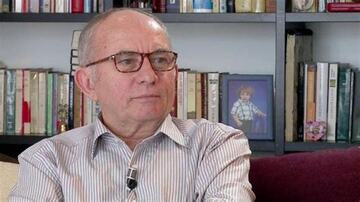
Ylljet Aliçka (AL/FR)
Ylljet Aliçka, a prominent Albanian writer and scriptwriter, has sculpted an inspiring artistic narrative that spans literature and cinema. Renowned for his impactful novels and thought-provoking screenplays, Aliçka's contributions have garnered both national and international recognition.
Born and residing in the vibrant city of Tirana, Albania, Aliçka's creative journey is punctuated by significant academic and professional milestones. From 1969 to 1973, he immersed himself in the realm of Natural Sciences at Tirana University. In 1991, he earned a Doctorate in Didactic Sciences, a testament to his commitment to education. Aliçka's scholarly achievements culminated in 2016 when he attained the esteemed title of Professor Doctor.
Aliçka's professional trajectory is marked by diverse roles that have enriched his life and career.
From 1973 to 1981, he devoted himself to education as a dedicated schoolmaster in Albania's Mat region. The period spanning 1981 to 1992 saw his involvement with the Publishing House of Schoolbooks in Tirana. Between 1992 and 1997, he played a pivotal role as Head of International Relations at the Ministry of Culture, representing Albania to the CDDC-Council of Europe. From 1998 to 2007, Aliçka served as a Communication Officer at the Delegation of the European Commission, further fostering international connections.
His influence reached its zenith from 2007 to 2013 when he assumed the role of Ambassador of Albania to France, Monaco, Portugal, Algeria, and UNESCO, also representing the President of the Republic at Agence International de la Francophonie. He extended his diplomatic endeavors from 2014 to 2019, representing Albania at Eurimage (Council of Europe). Between 2013 and 2020, Aliçka shared his expertise as a Professor at the European University of Tirana. His academic journey expanded into 2020 and beyond, encompassing roles at Albanian Mediterranean University and University of Arts.
His profound connections with the artistic community are evidenced by his honorary citizenship in La Republique De Montmartre and membership in the French Academy Berry-Georges Sand.
Ylljet Aliçka's artistic journey encapsulates a profound commitment to education, diplomacy, literature, and cinema, making him an influential figure on both national and international stages.
Ylljet Aliçka, a prominent Albanian writer and scriptwriter, has sculpted an inspiring artistic narrative that spans literature and cinema. Renowned for his impactful novels and thought-provoking screenplays, Aliçka's contributions have garnered both national and international recognition.
Born and residing in the vibrant city of Tirana, Albania, Aliçka's creative journey is punctuated by significant academic and professional milestones. From 1969 to 1973, he immersed himself in the realm of Natural Sciences at Tirana University. In 1991, he earned a Doctorate in Didactic Sciences, a testament to his commitment to education. Aliçka's scholarly achievements culminated in 2016 when he attained the esteemed title of Professor Doctor.
Aliçka's professional trajectory is marked by diverse roles that have enriched his life and career.
From 1973 to 1981, he devoted himself to education as a dedicated schoolmaster in Albania's Mat region. The period spanning 1981 to 1992 saw his involvement with the Publishing House of Schoolbooks in Tirana. Between 1992 and 1997, he played a pivotal role as Head of International Relations at the Ministry of Culture, representing Albania to the CDDC-Council of Europe. From 1998 to 2007, Aliçka served as a Communication Officer at the Delegation of the European Commission, further fostering international connections.
His influence reached its zenith from 2007 to 2013 when he assumed the role of Ambassador of Albania to France, Monaco, Portugal, Algeria, and UNESCO, also representing the President of the Republic at Agence International de la Francophonie. He extended his diplomatic endeavors from 2014 to 2019, representing Albania at Eurimage (Council of Europe). Between 2013 and 2020, Aliçka shared his expertise as a Professor at the European University of Tirana. His academic journey expanded into 2020 and beyond, encompassing roles at Albanian Mediterranean University and University of Arts.
His profound connections with the artistic community are evidenced by his honorary citizenship in La Republique De Montmartre and membership in the French Academy Berry-Georges Sand.
Ylljet Aliçka's artistic journey encapsulates a profound commitment to education, diplomacy, literature, and cinema, making him an influential figure on both national and international stages.
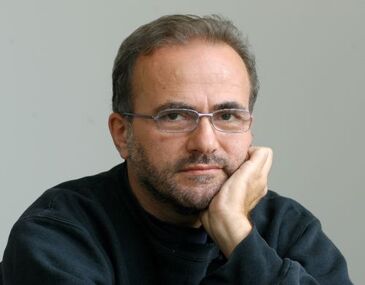
Vladimir Levchev (BUL)
Vladimir Levchev was born in Sofia, Bulgaria, in 1957. He graduated from the Academy of Fine Arts in Sofia in 1982, and from the MFA program in Creative Writing at American University, Washington, D.C., in 1996, as a Fulbright scholar.
His poetry collections include The Rainbow Mason (Charlottesville, VA: Cornerstone Press, 2005), Heavenly Balkans (Washington, DC: Argon House Press, 2002), Black Book of the Endangered Species (Washington, DC: Word Works, 1999, translated from Bulgarian by the author with Pulitzer-Prize winning poet Henry Taylor), Leaves from the Dry Tree (Merrick, New York: Cross-Cultural Communications, 1996, translated with Henry Taylor). Last year, Janet-45 Publ. in Plovdiv, Bulgaria, published his book Who Is Dreaming My Life: 1977 – 2007, a selection from the 13 poetry books he has published in Bulgarian in the past 30 years.
Levchev is also the author of the novel Krali Marko:The Balkan Prince, many essays and articles. He founded the first Bulgarian independent magazine Glas, which was banned by the Communist authorities before November 10, 1989. He has worked as poetry editor with Narodna Kultura Publishers, journalist and editor with Democratsia, and Literaturen Vestnik, general coordinator of Free Poetry Society.
Between 1994 and 2007, Vladimir Levchev resided in Washington, DC, where he has worked as a university professor of literature, high school teacher, translator, mailman, and book seller. Currently he is an Assistant Professor of Writing and Literature at the American University in Bulgaria, Blagoevgrad.
Vladimir Levchev was born in Sofia, Bulgaria, in 1957. He graduated from the Academy of Fine Arts in Sofia in 1982, and from the MFA program in Creative Writing at American University, Washington, D.C., in 1996, as a Fulbright scholar.
His poetry collections include The Rainbow Mason (Charlottesville, VA: Cornerstone Press, 2005), Heavenly Balkans (Washington, DC: Argon House Press, 2002), Black Book of the Endangered Species (Washington, DC: Word Works, 1999, translated from Bulgarian by the author with Pulitzer-Prize winning poet Henry Taylor), Leaves from the Dry Tree (Merrick, New York: Cross-Cultural Communications, 1996, translated with Henry Taylor). Last year, Janet-45 Publ. in Plovdiv, Bulgaria, published his book Who Is Dreaming My Life: 1977 – 2007, a selection from the 13 poetry books he has published in Bulgarian in the past 30 years.
Levchev is also the author of the novel Krali Marko:The Balkan Prince, many essays and articles. He founded the first Bulgarian independent magazine Glas, which was banned by the Communist authorities before November 10, 1989. He has worked as poetry editor with Narodna Kultura Publishers, journalist and editor with Democratsia, and Literaturen Vestnik, general coordinator of Free Poetry Society.
Between 1994 and 2007, Vladimir Levchev resided in Washington, DC, where he has worked as a university professor of literature, high school teacher, translator, mailman, and book seller. Currently he is an Assistant Professor of Writing and Literature at the American University in Bulgaria, Blagoevgrad.

Prof. Zharko Basheski (MKD)
Zharko Basheski is a Macedonian sculptor and professor in the Sculpture Department at the Faculty of Fine Arts in Skopje. His work falls under the hyperrealism movement, with a specific focus on the human body.
Basheski was born on 11 August 1957 in Prilep, Republic of Macedonia, then part of SFR Yugoslavia. In 1988, he graduated at the Faculty of Fine Arts in Skopje in the class of Petar Hadzi Boskov. Ten years later, in 1998, he acquired his MFA degree at the same institution in the class of Dragan Popovski - Dada. He is member of DLUM (Macedonian Artists Association) since 1988. From 1999 to 2009 he was head of Department of Sculpture at the Faculty of Fine Arts. His work has been presented at several international exhibitions and he has been the recipient of numerous awards. Much of his work is in private collections in the Republic of Macedonia and in foreign countries. Currently he is a member of the National Board for Accreditation and Evaluation, the Senate of the Ss. Cyril and Methodius University of Skopje and the Inter-University conference.
The interest in his work is turned towards the human, hence the interest in hyperrealistic approach in shaping the concept of the work, which in the theoretical projection exceeds hyperrealism, talks about life and the world in which we live. In his work there are several elements which are new to the world of sculpture and that make his latest work different: the concept, contemporary views of human condition through self-observation, technical production and use of new materials (resin polyester, polymarble, silicone, natural hair), the hyper-realistic treatment, size of the work, the philosophical approach – all of which, when combined in one, offer a multilayered reading of the artwork.
Zharko Basheski is a Macedonian sculptor and professor in the Sculpture Department at the Faculty of Fine Arts in Skopje. His work falls under the hyperrealism movement, with a specific focus on the human body.
Basheski was born on 11 August 1957 in Prilep, Republic of Macedonia, then part of SFR Yugoslavia. In 1988, he graduated at the Faculty of Fine Arts in Skopje in the class of Petar Hadzi Boskov. Ten years later, in 1998, he acquired his MFA degree at the same institution in the class of Dragan Popovski - Dada. He is member of DLUM (Macedonian Artists Association) since 1988. From 1999 to 2009 he was head of Department of Sculpture at the Faculty of Fine Arts. His work has been presented at several international exhibitions and he has been the recipient of numerous awards. Much of his work is in private collections in the Republic of Macedonia and in foreign countries. Currently he is a member of the National Board for Accreditation and Evaluation, the Senate of the Ss. Cyril and Methodius University of Skopje and the Inter-University conference.
The interest in his work is turned towards the human, hence the interest in hyperrealistic approach in shaping the concept of the work, which in the theoretical projection exceeds hyperrealism, talks about life and the world in which we live. In his work there are several elements which are new to the world of sculpture and that make his latest work different: the concept, contemporary views of human condition through self-observation, technical production and use of new materials (resin polyester, polymarble, silicone, natural hair), the hyper-realistic treatment, size of the work, the philosophical approach – all of which, when combined in one, offer a multilayered reading of the artwork.
Dimitar Malidanov (MKD)
Dimitar Malidanov is a prominent artist from Northern Macedonia.
Malidanov was born on December 5, 1946 in the water village of Sarakinovo, Greece ( Greek Sarakini ). During The civil war in Greece was taken out of the country in the group of so-called refugee children. In 1972 he graduated from the painting department at the Academy of Fine Arts in Ljubljana with a professor Gabriel Stupitsa. After the opening of Faculty of Fine Arts at the University of Skopje, Malidanov began teaching graphics in it. He worked in the faculty from 1981 to 2010, and from 2006 to 2010 he was its dean.
He is the author of many solo and a participant in many group exhibitions. For his artistic and pedagogical activities he has won many awards, including „October 11“.
Dimitar Malidanov is a prominent artist from Northern Macedonia.
Malidanov was born on December 5, 1946 in the water village of Sarakinovo, Greece ( Greek Sarakini ). During The civil war in Greece was taken out of the country in the group of so-called refugee children. In 1972 he graduated from the painting department at the Academy of Fine Arts in Ljubljana with a professor Gabriel Stupitsa. After the opening of Faculty of Fine Arts at the University of Skopje, Malidanov began teaching graphics in it. He worked in the faculty from 1981 to 2010, and from 2006 to 2010 he was its dean.
He is the author of many solo and a participant in many group exhibitions. For his artistic and pedagogical activities he has won many awards, including „October 11“.

Rade Siljan (MKD)
Rade Siljan ( born surname Pavlovski) was born on April 16 1950 year in the village Zhvan, Demir Hisar.
He finished his primary education in his hometown, high school in Bitola, and the Faculty of Philology at the University „ St. Cyril and Methodius“ in Skopje. He worked as a journalist at „Studentski zbor“, „Nas Svet“, „ Railway News “ and Radio Skopje. He was the editor-in-chief of the Third Program of Macedonian Radio and the Director General of „ Macedonska kniga“. He is also the founder and director of bookkeeping „Matica Macedonska“ from Skopje.
Siljan is a member of DPM from 1982. In two terms he was president of The Society of Writers of Macedonia, as well as President of the Assembly of the DPM.
Siljan is a member of the Association of Literary Translators of Macedonia and Macedonian PEN Center. Editor-in-Chief of the edition „ Macedonian Temptations“ and member of the editorial board for the preparation of the publishing project „135 volumes Macedonian literature “. He is an honorary member of the Macedonian Society for Science and Art in Bitola. He is also a member of the International Academy „ Mihai Eminescu“ in This, Romania and the Slavic Academy in Varna, Bulgaria.
Twenty-four of his books have been translated into: English, Russian, Turkish, Greek, Italian, Bulgarian, Serbian, Ukrainian, Polish, Latin, Romanian, Montenegrin, Vlach, Slovenian, Bosnian and Albanian.
Rade Siljan ( born surname Pavlovski) was born on April 16 1950 year in the village Zhvan, Demir Hisar.
He finished his primary education in his hometown, high school in Bitola, and the Faculty of Philology at the University „ St. Cyril and Methodius“ in Skopje. He worked as a journalist at „Studentski zbor“, „Nas Svet“, „ Railway News “ and Radio Skopje. He was the editor-in-chief of the Third Program of Macedonian Radio and the Director General of „ Macedonska kniga“. He is also the founder and director of bookkeeping „Matica Macedonska“ from Skopje.
Siljan is a member of DPM from 1982. In two terms he was president of The Society of Writers of Macedonia, as well as President of the Assembly of the DPM.
Siljan is a member of the Association of Literary Translators of Macedonia and Macedonian PEN Center. Editor-in-Chief of the edition „ Macedonian Temptations“ and member of the editorial board for the preparation of the publishing project „135 volumes Macedonian literature “. He is an honorary member of the Macedonian Society for Science and Art in Bitola. He is also a member of the International Academy „ Mihai Eminescu“ in This, Romania and the Slavic Academy in Varna, Bulgaria.
Twenty-four of his books have been translated into: English, Russian, Turkish, Greek, Italian, Bulgarian, Serbian, Ukrainian, Polish, Latin, Romanian, Montenegrin, Vlach, Slovenian, Bosnian and Albanian.
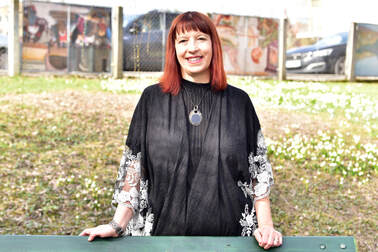
Lidija Dimkovska (MKD)
She is a poet, novelist, essayist, and translator from Romanian and Slovenian into Macedonian, born in 1971. She took Ph.D. degree in Romanian literature at University of Bucharest, Romania where she worked as lecturer of Macedonian language and literature. Now she lives in Ljubljana, Slovenia. She has published seven books of poetry, three novels, one American diary, one short stories collection, and edited four anthologies. Her books have been translated in numerous languages. For her poetry she received the Macedonian award for debut (1993), the German prize »Hubert Burda« (2009), the Romanian prizes “Poesis”(2002) and “Tudor Arghezi” (2012), the European prize “Petru Krdu” (2016), the Slovenian prize “The Glass of Immortality” (2020), the Macedonian/Albanian prize “Naim Frasheri”(2020) and the Macedonian prize “Brothers Miladinov”(2021). Her both novels “Hidden Camera” (2004) and “A Spare Life” (2012) received the award of Writers’ Union of Macedonia for the best prose book of the year and her novel “A Spare Life” received also the European Union Prize for Literature (2013). Her third novel “Non-Oui” was shortlisted for the award of Writers’ Union of Macedonia for the best prose book of the year and for the International literary award Balkanika (2016). Her short stories collection “When I Left Karl Liebknecht” was also shortlisted for the award of Writers’ Union of Macedonia for the best prose book of the year (2020) and five stories from the book received the Special Mention for European Cultural Heritage in 2018 in Vienna, Austria. She has participated at numerous international literary festivals and was a writer-in-residence in Iowa, London, Berlin, Vienna, Graz, Salzburg, Krems, Tirana, Čortanovci, Okinawa, and Split.
She is a poet, novelist, essayist, and translator from Romanian and Slovenian into Macedonian, born in 1971. She took Ph.D. degree in Romanian literature at University of Bucharest, Romania where she worked as lecturer of Macedonian language and literature. Now she lives in Ljubljana, Slovenia. She has published seven books of poetry, three novels, one American diary, one short stories collection, and edited four anthologies. Her books have been translated in numerous languages. For her poetry she received the Macedonian award for debut (1993), the German prize »Hubert Burda« (2009), the Romanian prizes “Poesis”(2002) and “Tudor Arghezi” (2012), the European prize “Petru Krdu” (2016), the Slovenian prize “The Glass of Immortality” (2020), the Macedonian/Albanian prize “Naim Frasheri”(2020) and the Macedonian prize “Brothers Miladinov”(2021). Her both novels “Hidden Camera” (2004) and “A Spare Life” (2012) received the award of Writers’ Union of Macedonia for the best prose book of the year and her novel “A Spare Life” received also the European Union Prize for Literature (2013). Her third novel “Non-Oui” was shortlisted for the award of Writers’ Union of Macedonia for the best prose book of the year and for the International literary award Balkanika (2016). Her short stories collection “When I Left Karl Liebknecht” was also shortlisted for the award of Writers’ Union of Macedonia for the best prose book of the year (2020) and five stories from the book received the Special Mention for European Cultural Heritage in 2018 in Vienna, Austria. She has participated at numerous international literary festivals and was a writer-in-residence in Iowa, London, Berlin, Vienna, Graz, Salzburg, Krems, Tirana, Čortanovci, Okinawa, and Split.
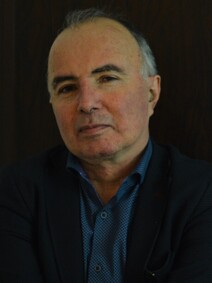
Ermis Lafazanovski (MKD)
He was born in Kluz-Napoka (Romania) in 1961. He is Macedonian novelist, short-stories writer, literary essays, anthropology studies writer, and translator. Graduated from the Faculty of Philology in Skopje. He received his Ph.D. in Philology at the same Faculty. So far, he has published dozen novels, short story collections and non-fiction books. His works have been translated into various languages. In 2001 he received the Stale Popov Prize of the Macedonian Writers’ Association for the novel “Describer” and in 2003 the “Prose Masters” award for the novel “The Novel About Weapons”. His novel “Hrapeshko” was nominated in 2006 as the Macedonian contribution for the ‘Balkanika’ award and has been translated in Albanian, Serbian, Bulgarian, Polish, Russian, Croatian, Slovenian, Arab and English. He is also translating from Romanian language. Ermis Lafazanovski, currently is acting as Director of the Institute of Folklore “Marko Cepenkov” in Skopje, professor of Oral Narratives at the Department of Folk Literature at the Institute and Visiting Professor at the American College in Skopje. His main area of research interest is: folk narratives, oral history, urban folklore, ethnography of literature, visual rhetoric and he wrote books about Balkan and Macedonian folklore and cultural anthropology. He is a member of Macedonian Writers Association and Macedonian PEN (President of Macedonian PEN : 2015 - 2017)
He was born in Kluz-Napoka (Romania) in 1961. He is Macedonian novelist, short-stories writer, literary essays, anthropology studies writer, and translator. Graduated from the Faculty of Philology in Skopje. He received his Ph.D. in Philology at the same Faculty. So far, he has published dozen novels, short story collections and non-fiction books. His works have been translated into various languages. In 2001 he received the Stale Popov Prize of the Macedonian Writers’ Association for the novel “Describer” and in 2003 the “Prose Masters” award for the novel “The Novel About Weapons”. His novel “Hrapeshko” was nominated in 2006 as the Macedonian contribution for the ‘Balkanika’ award and has been translated in Albanian, Serbian, Bulgarian, Polish, Russian, Croatian, Slovenian, Arab and English. He is also translating from Romanian language. Ermis Lafazanovski, currently is acting as Director of the Institute of Folklore “Marko Cepenkov” in Skopje, professor of Oral Narratives at the Department of Folk Literature at the Institute and Visiting Professor at the American College in Skopje. His main area of research interest is: folk narratives, oral history, urban folklore, ethnography of literature, visual rhetoric and he wrote books about Balkan and Macedonian folklore and cultural anthropology. He is a member of Macedonian Writers Association and Macedonian PEN (President of Macedonian PEN : 2015 - 2017)
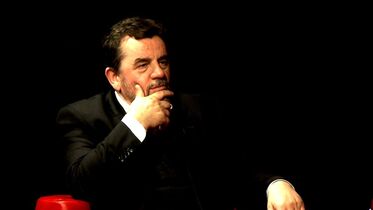
Milazim Krasniqi (KS)
Associate Professor of Journalism in the University of Prishtina “Hasan Prishtina”, Milazim Krasniqi is head of the Department of Journalism in Faculty of Philology. Founder of Institute of Media, first editor of scientific journal “Media”. Krasniqi has been member of the Board of Directors of Radio Television of Kosovo (2001-2009) and member of the Steering Council of the University of Prishtina (2009-2011).
One of the founders of the Democratic League of Kosovo, a close associate of the late President Ibrahim Rugova, Krasniqi is a lecturer, poet, novelist, playwright, publicist and political commentator.
For over ten years he has served as secretary of the Kosovo Writers Association, editor-in-chief of “Fjala” and “Interesi Nacional” magazine, editor-in-chief of the daily newspaper “Bota Sot” and a regular columnist for various newspapers and magazines. He has also been a regular contributor to Radio Free Europe, Albanian-language broadcasts for several years.
Some of his over 40 books that include poetry, novels, dramas, studies and publicist writing are: “Letërsia dhe besimet fetare” (“Literature and Religious Beliefs”), “Soneti në poezinë shqipe” (“Sonnet in Albanian Poetry”), “Islami i keqkuptuar dhe fatkeqësia botërore” (“Misunderstood Islam and World Misfortune”), “Fotografitë e kujtimeve” (“Photographs of Memories”), “Rulet rus për Ali Pashën” (“Russian Rolls for Ali Pasha”), “Monedha e Gentit” “The Currency of Gent”, “Nacionalizmi shqiptar” (“Albanian Nationalism”), “E kujt është kjo kulturë” (“Whose culture is this”).
Krasniqi is also the author of university textbooks “Hyrje në Gazetari” (“Introduction to Journalism”), “Ekskomunikimi si histori e fshehur” (“Excommunication as a hidden story”),“Hipodromedia” and mentor to many Master's and PhD students. There are a number of academic papers published in numerous local and international journals, including: “Media” and “Seminari” - University of Prishtina, “Sarajevske Sveske” - Sarajevo, “Vizione” - Skopje, “Yearbook” of the Academy of Sciences and Kosovo Arts, etc. He has presented papers in various scientific sessions such as the International Seminar on Albanian Language, Literature and Culture, the Central and Eastern European Communication and Media Conference, a conference in the Sakarya University, a conference in the UFO-University in Albania, etc.
Krasniqi was interviewed and quoted by BBC, CNN, Voice of America, Free Europe, Radio Television of Kosova, RTV 21, RTSH, TV Klan, 'Epoka e Re', 'Kosova Sot' and other regional media as well.
As a political commentator he has been invited many times to television programs and debates.
Associate Professor of Journalism in the University of Prishtina “Hasan Prishtina”, Milazim Krasniqi is head of the Department of Journalism in Faculty of Philology. Founder of Institute of Media, first editor of scientific journal “Media”. Krasniqi has been member of the Board of Directors of Radio Television of Kosovo (2001-2009) and member of the Steering Council of the University of Prishtina (2009-2011).
One of the founders of the Democratic League of Kosovo, a close associate of the late President Ibrahim Rugova, Krasniqi is a lecturer, poet, novelist, playwright, publicist and political commentator.
For over ten years he has served as secretary of the Kosovo Writers Association, editor-in-chief of “Fjala” and “Interesi Nacional” magazine, editor-in-chief of the daily newspaper “Bota Sot” and a regular columnist for various newspapers and magazines. He has also been a regular contributor to Radio Free Europe, Albanian-language broadcasts for several years.
Some of his over 40 books that include poetry, novels, dramas, studies and publicist writing are: “Letërsia dhe besimet fetare” (“Literature and Religious Beliefs”), “Soneti në poezinë shqipe” (“Sonnet in Albanian Poetry”), “Islami i keqkuptuar dhe fatkeqësia botërore” (“Misunderstood Islam and World Misfortune”), “Fotografitë e kujtimeve” (“Photographs of Memories”), “Rulet rus për Ali Pashën” (“Russian Rolls for Ali Pasha”), “Monedha e Gentit” “The Currency of Gent”, “Nacionalizmi shqiptar” (“Albanian Nationalism”), “E kujt është kjo kulturë” (“Whose culture is this”).
Krasniqi is also the author of university textbooks “Hyrje në Gazetari” (“Introduction to Journalism”), “Ekskomunikimi si histori e fshehur” (“Excommunication as a hidden story”),“Hipodromedia” and mentor to many Master's and PhD students. There are a number of academic papers published in numerous local and international journals, including: “Media” and “Seminari” - University of Prishtina, “Sarajevske Sveske” - Sarajevo, “Vizione” - Skopje, “Yearbook” of the Academy of Sciences and Kosovo Arts, etc. He has presented papers in various scientific sessions such as the International Seminar on Albanian Language, Literature and Culture, the Central and Eastern European Communication and Media Conference, a conference in the Sakarya University, a conference in the UFO-University in Albania, etc.
Krasniqi was interviewed and quoted by BBC, CNN, Voice of America, Free Europe, Radio Television of Kosova, RTV 21, RTSH, TV Klan, 'Epoka e Re', 'Kosova Sot' and other regional media as well.
As a political commentator he has been invited many times to television programs and debates.
